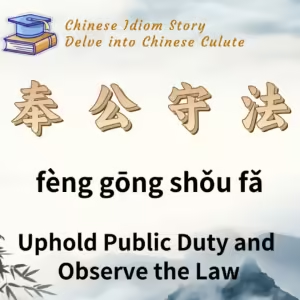
Chinese Idiom: 大公无私 (Da Gong Wu Si)
English Translation: Selfless and Impartial
pīn yīn: dà gōng wú sī
Idiom Meaning: Describes someone who acts with complete fairness and without personal bias, always prioritizing the interests of the public or a cause above personal gain.
Historical Source: The Annals of Lü Buwei
Idiom Story:
During the reign of Duke Ping of Jin, the region of Nanyang needed a new governor. Duke Ping asked his official Qi Huangyang for a recommendation. Qi Huangyang suggested Jie Hu, a person who was known to be his enemy.
Duke Ping was surprised and asked, “Isn’t Jie Hu your adversary? Why would you recommend him?” Qi Huangyang replied calmly, “Your Majesty asked who would be suitable for the position, not who is my enemy.”
Duke Ping appointed Jie Hu as the governor of Nanyang. Jie Hu proved to be an excellent administrator, doing many good deeds for the people and earning their praise.
Later, Duke Ping wanted to add a new Middle Army Commander and again asked Qi Huangyang for recommendations. Qi Huangyang suggested his own son, Qi Wu.
Duke Ping was even more surprised, “Qi Wu is your son. Aren’t you worried about what others might say?” Qi Huangyang responded with the same impartiality, “Your Majesty asked who would be suitable for the position, not whether Qi Wu is my son.”
Qi Wu was appointed and successfully performed his duties, handling justice and benefiting the people, gaining their admiration.
Confucius, upon hearing of these appointments, praised Qi Huangyang, saying: “Excellent! Qi Huangyang’s recommendations are truly selfless and impartial—he recommended an enemy for an external position and his own son for an internal one, demonstrating true impartiality and selflessness.”
This story illustrates the concept of “大公无私” (selfless and impartial), where personal feelings and relationships do not influence one’s decisions, highlighting a commitment to fairness and the greater good.






